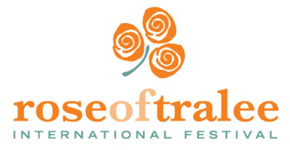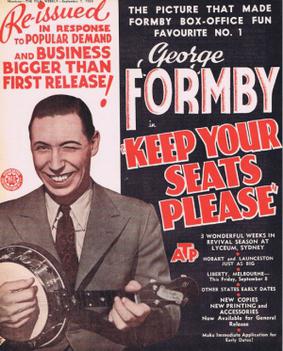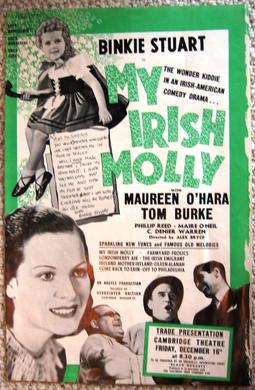Related Research Articles

Going My Way is a 1944 American musical comedy drama film directed by Leo McCarey and starring Bing Crosby and Barry Fitzgerald. Written by Frank Butler and Frank Cavett, based on a story by McCarey, the film is about a new young priest taking over a parish from an established old veteran. Crosby sings five songs with other songs performed onscreen by Metropolitan Opera's star mezzo-soprano Risë Stevens and the Robert Mitchell Boys Choir. Going My Way was followed the next year by a sequel, The Bells of St. Mary's.

The Rose of Tralee International Festival is an event which is celebrated among Irish communities all over the world. The festival, held annually in the town of Tralee in County Kerry, takes its inspiration from a 19th-century ballad of the same name about a woman called Mary, who because of her beauty was called "The Rose of Tralee". The words of the song are credited to C. Mordaunt Spencer and the music to Charles William Glover, but a story circulated in connection with the festival claims that the song was written by William Pembroke Mulchinock, a wealthy Protestant, out of love for Mary O'Connor, a poor Catholic maid in service to his parents.

Slane Castle is located in the village of Slane, within the Boyne Valley of County Meath, Ireland. The castle has been the family seat of the Conyngham family since it was built in the late 18th century, on land first purchased in 1703 by Brig.-Gen. Henry Conyngham.
The Barmitzvah Brothers are a Canadian indie pop band from Guelph. Known for their use of fiddle as well as unusual and homemade instruments, and for their quirky and original lyrics focusing on everyday life, the working world and ordinary people. The band's sound crosses many genres.

Keep Your Seats, Please is a 1936 British comedy film directed by Monty Banks and starring George Formby, Florence Desmond and Alastair Sim. It marked the film debut of the child star Binkie Stuart. The film was made by Associated Talking Pictures.

Mrs. O'Malley and Mr. Malone is a 1950 comedy/murder mystery film set on board a train. It stars Marjorie Main and James Whitmore. It is based on the short story "Once Upon a Train " by Stuart Palmer and Craig Rice.
(The) Rose of Tralee may refer to:

My Irish Molly is a 1938 British musical film, directed by Alex Bryce and starring Binkie Stuart, Tom Burke and Maureen O'Hara shot at Welwyn Studios with footage of Ireland. The screenplay concerns a young orphan who runs away from her mean-spirited guardian to live with her aunt. O'Hara appeared in the film under her real name of Maureen FitzSimmons. The film was released in the US in 1940 under the title My Little Molly with scenes of Binkie Stuart removed due to Maureen O'Hara being given top billing due to her American popularity.
Binkie Stuart was a Scottish film actress. During the 1930s she enjoyed brief fame as a child actress and was considered Britain's answer to Shirley Temple.
Kathleen Watkins is an Irish broadcaster, harpist, actress, singer and author. She is the widow of Gay Byrne.
The Naked Genius is a 1943 American play written by Gypsy Rose Lee. The work premiered on Broadway on October 21, 1943, at the Plymouth Theatre where it ran until November 20, 1943, for a total of 36 performances. The work was produced by Mike Todd, used sets designed by Frederick Fox, and costumes designed by Billy Livingston. The play was staged by George S. Kaufman, and starred Joan Blondell as Honey Bee Carroll, Pauline Myers as Angela, Millard Mitchell as Stuart Tracy, Rex O'Malley as Fred-Eric, Byron Russell as Williams, Bertha Belmore as Lollie Adams, Doro Merande as Myrtle McGuire, Donald Randolph as Charles Goodwin, Lewis Charles as Sam Hinkle, Rosemary Rice as Emily, Georgia Sothern as Alibassi, Phyllis Povah as Pansy, John Souther as Judge Taylor, Bernice Maison as Sally Martin, and Gil Maison as Teddy Martin.
Beloved Imposter is a 1936 British musical film directed by Victor Hanbury and starring Rene Ray, Fred Conyngham and Germaine Aussey. It was made at Welwyn Studios and released as a quota film by RKO Pictures. It was based on the novel Dancing Boy by Ethel Mannin.
Kathleen Butler was a British screenwriter who worked on the scripts of over 40 films. She also worked as assistant director on four films. Butler was part of a group of women given increasing control over the writing of scripts in British cinema of the time, writing The Temptress (1949) alone. She worked for much of her career for the production company Butcher's Film Service.

Ball at Savoy is a 1936 British operetta film directed by Victor Hanbury and starring Conrad Nagel, Marta Labarr and Fred Conyngham. The film is based on the 1932 operetta Ball im Savoy by Paul Abraham, which had been turned into an Austrian film in 1935. It was made at Elstree Studios.
This is a summary of 1942 in music in the United Kingdom.

St. Patrick's Day is a compilation album of phonograph records by Bing Crosby released in 1947 featuring songs with an Irish theme. This includes one of Crosby's most-beloved songs, "Too-Ra-Loo-Ra-Loo-Ral" which was number four on the Billboard Hot 100 for 12 weeks, and topped the Australian charts for an entire month, on shellac disc record. This version, the 1945 re-recording, was released earlier in another Crosby album, Selections from Going My Way.

Talbot O'Farrell was an English music hall and variety show singer whose repertoire included both sentimental and comic songs. Early in his career he used the stage names WillMcIver.

Flannelfoot is a 1953 British crime film directed by Maclean Rogers and starring Ronald Howard, Mary Germaine and Jack Watling. It was made at Walton Studios. The film's sets were designed by John Stoll.

Cracked Nuts is a 1941 American comedy film directed by Edward F. Cline and written by Erna Lazarus and Scott Darling. The film stars Stuart Erwin, Una Merkel, Mischa Auer, William Frawley, Shemp Howard and Astrid Allwyn. It was released on August 1, 1941, by Universal Pictures. The film is unrelated Wheeler & Woolsey film of 1931 by the same title, although Cline directed both films.

Pat O'Malley was an American vaudeville and stage performer prior to starting a prolific film career at the age of sixteen. He later had a career in television.